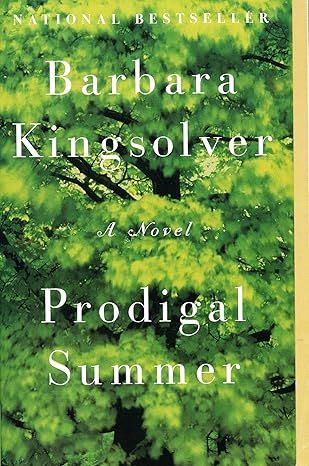Prodigal Summer: A Novel
4.4
-
6,309 ratings
National Bestseller
“A blend of breathtaking artistry, encyclopedic knowledge of the natural world. . . and ardent commitment to the supremacy of nature.” — San Francisco Chronicle
In this beautiful novel, Barbara Kingsolver, New York Times bestselling author of Demon Copperhead and The Poisonwood Bible, weaves together three stories of human love within a larger tapestry of lives inhabiting the forested mountains and struggling small farms of southern Appalachia.
Over the course of one humid summer, as the urge to procreate overtakes the lush countryside, this novel's intriguing protagonists—a reclusive wildlife biologist, a young farmer's wife marooned far from home, and a pair of elderly, feuding neighbors—face disparate predicaments but find connections to one another and to the flora and fauna with whom they necessarily share a place. Their discoveries are embedded inside countless intimate lessons of biology, the realities of small farming, and the final, urgent truth that humans are only one piece of life on earth.
Kindle
$8.99
Available instantly
Audiobook
$0.00
with membership trial
Hardcover
$13.99
Paperback
$9.99
Ships from
Amazon.com
Payment
Secure transaction
ISBN-10
0060959037
ISBN-13
978-0060959036
Print length
464 pages
Language
English
Publisher
Harper Perennial
Publication date
October 15, 2001
Dimensions
7.96 x 5.38 x 1.09 inches
Item weight
2.31 pounds
Popular highlights in this book
Solitude is a human presumption. Every quiet step is thunder to beetle life underfoot, a tug of impalpable thread on the web pulling mate to mate and predator to prey, a beginning or an end. Every choice is a world made new for the chosen.
Highlighted by 574 Kindle readers
Product details
ASIN :
B000QUCO8U
File size :
1806 KB
Text-to-speech :
Enabled
Screen reader :
Supported
Enhanced typesetting :
Enabled
X-Ray :
Enabled
Word wise :
Enabled
Editorial reviews
From Publishers Weekly
HA beguiling departure for Kingsolver, who generally tackles social themes with trenchantly serious messages, this sentimental but honest novel exhibits a talent for fiction lighter in mood and tone than The Poisonwood Bible and her previous works. There is also a new emphasis on the natural world, described in sensuous language and precise detail. But Kingsolver continues to take on timely issues, here focusing on the ecological damage caused by herbicides, ethical questions about raising tobacco, and the endangered condition of subsistence farming. A corner of southern Appalachia serves as the setting for the stories of three intertwined lives, and alternating chapters with recurring names signal which of the three protagonists is taking center stage. Each character suffers because his or her way of looking at the world seems incompatible with that of loved ones. In the chapters called "Predator," forest ranger Deanna Wolfe is a 40-plus wildlife biologist and staunch defender of coyotes, which have recently extended their range into Appalachia. Wyoming rancher Eddie Bondo also invades her territory, on a bounty hunt to kill the same nest of coyotes that Deanna is protecting. Their passionate but seemingly ill-fated affair takes place in summertime and mirrors "the eroticism of fecund woods" and "the season of extravagant procreation." Meanwhile, in the chapters called "Moth Love," newly married entomologist Lusa Maluf Landowski is left a widow on her husband's farm with five envious sisters-in-law, crushing debtsDand a desperate and brilliant idea. Crusty old farmer Garnett Walker ("Old Chestnuts") learns to respect his archenemy, who crusades for organic farming and opposes Garnett's use of pesticides. If Kingsolver is sometimes too blatant in creating diametrically opposed characters and paradoxical inconsistencies, readers will be seduced by her effortless prose, her subtle use of Appalachian patois. They'll also respond to the sympathy with which she reflects the difficult lives of people struggling on the hard edge of poverty while tied intimately to the natural world and engaged an elemental search for dignity and human connection. (Nov.) Copyright 2000 Reed Business Information, Inc.
From Library Journal
This novel covers the expanse of one summer in the lives of several people in a remote area of southern Appalachia. The central theme tying three separate story lines together is the importance, and fragility, of the biological ecosystems found in the natural world. This precarious balance between humans and everything elseDplants, bugs, moths, and mammalsDis examined, tested, rejected, and rejoiced in by a collage of characters, who include Deanna Wolfe, the park ranger who tries to protect a pack of coyotes that miraculously appear on Zebulon Mountain; Lusa Landowski, a city girl with a degree in entomology who raises and sells goat kids; and feuding neighbors Garnett Walker and Nannie Rawley. To follow The Poisonwood Bible would be a daunting task for any writer; for Kingsolver, it would seem to be just about spinning another marvelous, magical yarn, only in a different locale and filled with another batch of endearing, honest people. This time her message is about the environment and intelligent women who are more comfortable with a love of nature than love with a man. Kingsolver reads her own words as lyrically as she writes them. Very highly recommended for all public and academic libraries with audio literature collections.DGloria Maxwell, Penn Valley Community Coll., Kansas City, MO Copyright 2001 Reed Business Information, Inc.
From Booklist
Summer is the season for abundance and abandon, and all of its prodigal forces are at work in this seductive tale of romance, risk, conviction, and love. In her last novel, the acclaimed Poisonwood Bible (1998), Kingsolver, who came to fiction by way of biology, explored the complex relationship between humankind and the rest of nature in an African setting. Here she writes from home (the mountains and valleys of Appalachia) and dramatizes, more overtly than ever before, her deep knowledge of and profound respect for life on earth as she presents the adventures of three free-spirited and capable heroines. Deanna Wolfe, a passionate Forest Service wildlife biologist, lives alone in the woods far above her hometown. After discovering a family of coyotes, she becomes determined to protect them, a mission jeopardized by her equally intense desire for a handsome hunter. Lusa Maluf Landowski, a scientist of Polish Jewish and Palestinian descent, married into a clannish farming family skeptical of her obsession with insects. Septuagenarian Nannie Land Rawley, an organic apple grower and jane-of-all-trades, feuds with her crotchety, fundamentalist widower neighbor, Garnett Walker, whose dream is to create a new strain of blight-resistant chestnut trees. Kingsolver unabashedly uses the predicaments of her Appalachian characters to dispense ecological insights, praise the old ways of living, and glory in the beauty of nature. Her fervor to impart her land ethics frequently renders her narrative polemic, but her prose is lush and spellbinding, her humor subtle, and her story compelling, intelligent, sexy, and cathartic. Donna Seaman Copyright © American Library Association. All rights reserved
Read more
Sample
{1}
Predators
Her body moved with the frankness that comes from solitary habits. But solitude is only a human -presumption. Every quiet step is thunder to beetle life underfoot; every choice is a world made new for the chosen. All secrets are witnessed.
If someone in this forest had been watching her—a man with a gun, for instance, hiding inside a copse of leafy beech trees—he would have noticed how quickly she moved up the path and how direly she scowled at the ground ahead of her feet. He would have judged her an angry woman on the trail of something hateful.
He would have been wrong. She was frustrated, it’s true, to be following tracks in the mud she couldn’t identify. She was used to being sure. But if she’d troubled to inspect her own mind on this humid, sunlit morning, she would have declared herself happy. She loved the air after a hard rain, and the way a forest of dripping leaves fills itself with a sibilant percussion that empties your head of words. Her body was free to follow its own rules: a long-legged gait too fast for companionship, unself-conscious squats in the path where she needed to touch broken foliage, a braid of hair nearly as thick as her forearm falling over her shoulder to sweep the ground whenever she bent down. Her limbs rejoiced to be outdoors again, out of her tiny cabin whose log walls had grown furry and overbearing during the long spring rains. The frown was pure concentration, nothing more. Two years alone had given her a blind person’s indifference to the look on her own face.
All morning the animal trail had led her uphill, ascending the mountain, skirting a rhododendron slick, and now climbing into an old-growth forest whose steepness had spared it from ever being logged. But even here, where a good oak-hickory canopy sheltered the ridge top, last night’s rain had pounded through hard enough to obscure the tracks. She knew the animal’s size from the path it had left through the glossy undergrowth of mayapples, and that was enough to speed up her heart. It could be what she’d been looking for these two years and more. This lifetime. But to know for sure she needed details, especially the faint claw mark beyond the toe pad that distinguishes canid from feline. That would be the first thing to vanish in a hard rain, so it wasn’t going to appear to her now, however hard she looked. Now it would take more than tracks, and on this sweet, damp morning at the beginning of the world, that was fine with her. She could be a patient tracker. Eventually the animal would give itself away with a mound of scat (which might have dissolved in the rain, too) or something else, some sign particular to its species. A bear will leave claw marks on trees and even bite the bark sometimes, though this was no bear. It was the size of a German shepherd, but no house pet, either. The dog that had laid this trail, if dog it was, would have to be a wild and hungry one to be out in such a rain.
She found a spot where it had circled a chestnut stump, probably for scent marking. She studied the stump: an old giant, raggedly rotting its way backward into the ground since its death by ax or blight. Toadstools dotted the humus at its base, tiny ones, brilliant orange, with delicately ridged caps like open parasols. The downpour would have obliterated such fragile things; these must have popped up in the few hours since the rain stopped—after the animal was here, then. Inspired by its ammonia. She studied the ground for a long time, unconscious of the elegant length of her nose and chin in profile, unaware of her left hand moving near her face to disperse a cloud of gnats and push stray hair out of her eyes. She squatted, steadied herself by placing her fingertips in the moss at the foot of the stump, and pressed her face to the musky old wood. Inhaled.
“Cat,” she said softly, to nobody. Not what she’d hoped for, but a good surprise to find evidence of a territorial bobcat on this ridge. The mix of forests and wetlands in these mountains could be excellent core habitat for cats, but she knew they mostly kept to the limestone river cliffs along the Virginia-Kentucky border. And yet here one was. It explained the cries she’d heard two nights ago, icy shrieks in the rain, like a woman’s screaming. She’d been sure it was a bobcat but still lost sleep over it. No human could fail to be moved by such human-sounding anguish. Remembering it now gave her a shiver as she balanced her weight on her toes and pushed herself back upright to her feet.
And there he stood, looking straight at her. He was dressed in boots and camouflage and carried a pack larger than hers. His rifle was no joke—a thirty-thirty, it looked like. Surprise must have stormed all over her face before she thought to arrange it for human inspection. It happened, that she ran into hunters up here. But she always saw them first. This one had stolen her advantage—he’d seen inside her.
“Eddie Bondo,” is what he’d said, touching his hat brim, though it took her a moment to work this out.
“What?”
“That’s my name.”
“Good Lord,” she said, able to breathe out finally. “I didn’t ask your name.”
“You needed to know it, though.”
Cocky, she thought. Or cocked, rather. Like a rifle, ready to go off. “What would I need your name for? You fixing to give me a story I’ll want to tell later?” she asked quietly. It was a tactic learned from her father, and the way of mountain people in general—to be quiet when most agitated.
“That I can’t say. But I won’t bite.” He grinned—apologetically, it seemed. He was very much younger than she. His left hand reached up to his shoulder, fingertips just brushing the barrel of the rifle strapped to his shoulder. “And I don’t shoot girls.”
“Well. Wonderful news.”
Bite, he’d said, with the northerner’s clipped i. An outsider, intruding on this place like kudzu vines. He was not very tall but deeply muscular in the way that shows up through a man’s clothing, in his wrists and neck and posture: a build so accustomed to work that it seems tensed even when at ease. He said, “You sniff stumps, I see.”
“I do.”
“You got a good reason for that?”
“Yep.”
“You going to tell me what it is?”
“Nope.”
Another pause. She watched his hands, but what pulled on her was the dark green glint of his eyes. He observed her acutely, seeming to evaluate her hill-inflected vowels for the secrets behind her “yep” and “nope.” His grin turned down on the corners instead of up, asking a curved parenthetical question above his right-angled chin. She could not remember a more compelling combination of features on any man she’d ever seen.
“You’re not much of a talker,” he said. “Most girls I know, they’ll yap half the day about something they haven’t done yet and might not get around to.”
“Well, then. I’m not most girls you know.”
She wondered if she was antagonizing him. She didn’t have a gun, and he did, though he’d promised not to shoot. Or bite, for that matter. They stood without speaking. She measured the silence by the cloud that crossed the sun, and by the two full wood-thrush songs that rang suddenly through the leaves and hung in the air between herself and this man, her—prey? No, her trespasser. Predator was a strong presumption.
“All right if I just follow you for a while?” he asked politely.
“No,” she snapped. “That wouldn’t suit me.”
Man or boy, what was he? His grin dissolved, and he seemed suddenly wounded by her curtness, like a scolded son. She wondered about the proper tone, how to do that. She knew how to run off a hunter who’d forgotten when deer season ended—that was her job. But usually by this point in the conversation, it was over. And manners had not been her long suit to begin with, even a lifetime ago when she lived in a brick house, neatly pressed between a husband and neighbors. She pushed four fingers into her hair, the long brown bolt of it threaded with silver, and ran them backward from her hairline to tuck the unraveled threads back into the braid at her nape.
“I’m tracking,” she said quietly. “Two people make more than double the noise of one. If you’re a hunter I expect you’d know that already.”
“I don’t see your gun.”
“I don’t believe I’m carrying one. I believe we’re on National Forest land, inside of a game-protection area where there’s no hunting.”
“Well, then,” said Eddie Bondo. “That would explain it.”
“Yes, it would.”
He stood his ground, looking her up and down for the longest while. Long enough for her to understand suddenly that Eddie Bondo—man, not child—had taken off all her layers and put them back on again in the right order. The dark-green nylon and Gore-Tex were regulation Forest Service, the cotton flannel was hers, likewise the silk thermal long johns, and what a man might find of interest underneath all that she had no idea. No one had been there in quite a while.
Then he was gone. Birdsong clattered in the space between trees, hollow air that seemed vast now and suddenly empty. He had ducked headfirst into the rhododendrons, leaving behind no reason to think he’d ever been there at all.
A hot blush was what he left her, burning on the skin of her neck.
She went to bed with Eddie Bondo all over her mind and got up with a government-issue pistol tucked in her belt. The pistol was something she was supposed to carry for bear, for self-defense, and she told herself that was half right.
For two days she saw him everywhere—ahead of her on the path at dusk; in her cabin with the moonlit window behind him. In dreams. On the first evening she tried to distract or deceive her mind with books, and on the second she carefully bathed with her teakettle and cloth and the soap she normally eschewed because it assaulted the noses of deer and other animals with the only human smell they knew, that of hunters—the scent of a predator. Both nights she awoke in a sweat, disturbed by the fierce, muffled sounds of bats mating in the shadows under her porch eaves, aggressive copulations that seemed to be collisions of strangers.
And now, here, in the flesh in broad daylight beside this chestnut stump. For when he showed up again, it was in the same spot. This time he carried his pack but no rifle. Her pistol was inside her jacket, loaded, with the safety on.
Once again she’d been squatting by the stump looking for sign, very sure this time that she was on the trail of what she wanted. No question, these tracks were canine: the female, probably, whose den she’d located fourteen days ago. Male or female, it had paused by this stump to notice the bobcat’s mark, which might have intrigued or offended or maybe meant nothing at all to it. Hard for a human ever to know that mind.
And once again—as if her rising up from that stump had conjured Eddie Bondo, as if he had derived from the rush of blood from her head—he stood smiling at her.
“There you are,” he said. “Not most girls I know.”
Her heart beat hard enough to dim her hearing in pulses.
“I’m the only one you know, looks like, if you’d be hanging around the Zebulon National Forest. Which you seem to be.”
He was hatless this time, black-haired and just a little shaggy like a crow in the misty rain. His hair had the thick, glossy texture she envied slightly, for it was perfectly straight and easy and never would tangle. He spread his hands. “Look, ranger lady. No gun. Behold a decent man abiding by the law.”
“So I see.”
“More than I can say for you,” he added. “Sniffing stumps.”
“No, I couldn’t lay any claim on being decent. Or a man.”
His grin grew a shade darker. “That I can see.”
I have a gun. He can’t hurt me, but she knew as she thought these words that some other tables had turned. He’d come back. She had willed him back to this spot. And she would wait him out this time. He didn’t speak for a minute or more. Then gave in. “I’m sorry,” he said.
“For what?”
“For pestering you. But I’m determined to follow you up this trail today, for just a little while. If you don’t mind.”
“What is it you’re so determined to find out?”
“What a nice girl like you is sniffing for in this big old woods. It’s been keeping me up nights.”
He’d thought of her, then. At night.
“I’m not Little Red Riding Hood, if that’s what’s worrying you. I’m twice as old as you are.” Twiced as old, she’d said, a long-extinguished hillbilly habit tunneling into her unpracticed talk.
“I doubt that sincerely,” he said.
She waited for more, and he offered this: “I’ll keep a little distance, if you like.”
What she didn’t like was the idea of his being behind her. “My preference would be for you to walk on ahead, and please take care not to step on the trail of this animal I’m tracking. If you can see to keep off of it.” She pointed to the three-day-old cat tracks, not the fresher trail in the leaf mold on the down side of the trail.
“Yes ma’am, I believe I can do that.” He bowed slightly, turned, and walked ahead, his feet keeping an expert’s distance from the tracks and hardly turning the leaf mold, either. He was good. She let him almost disappear into the foliage ahead, then she took up the trail of the two males walking side by side, cat and man. She wanted to watch him walk, to watch his body without his knowing it.
It was late afternoon, already something close to dark on the north side of the mountain, where rhododendrons huddled in the cleft of every hollow. In their dense shade the ground was bare and slick. A month from now the rhododendrons would be covered with their big spheres of pink blossoms like bridesmaids’ bouquets, almost too show-off fancy for a wildwood flower on this lonely mountain. But for now their buds still slept. Now it was only the damp earth that blossomed in fits and throes: trout lilies, spring beauties, all the understory wildflowers that had to hurry through a whole life cycle between May’s first warmth—while sunlight still reached through the bare limbs—and the shaded darkness of a June forest floor. Way down around the foot of this mountain in the valley farmland, springtime would already be winding down by the first week of May, but the tide of wildflowers that swept up the mountainsides had only just arrived up here at four thousand feet. On this path the hopeful flower heads were so thick they got crushed underfoot. In a few more weeks the trees would finish leafing out here, the canopy would close, and this bloom would pass on. Spring would move higher up to awaken the bears and finally go out like a flame, absorbed into the dark spruce forest on the scalp of Zebulon Mountain. But here and now, spring heaved in its randy moment. Everywhere you looked, something was fighting for time, for light, the kiss of pollen, a connection of sperm and egg and another chance.
He paused twice on the trail ahead of her, once beside a flame azalea so covered with flowers it resembled a burning bush, and once for no reason she could see. But he never turned around. He must be listening for her step, she thought. At least that, or maybe not. It really didn’t matter.
They reached the point where the old bobcat trail went straight up the slope, and she let him go. She waited until he was out of sight, and then turned downhill instead, stepping sideways down the steep slope until her feet found familiar purchase on one of the Forest Service trails. She maintained miles of these trails, a hundred or more over the course of months, but this one never got overgrown because it ran between her cabin and an overlook she loved. The fresher tracks had diverged from the bobcat trail and here they were again, leading exactly where she thought they’d go: downhill, in the direction of her recent discovery. Today she would bypass that trail. She’d already forced herself to stay away for two weeks—fourteen long days, counted like seasons or years. This was the eighth of May, the day she’d meant to allow herself to go back there, sneaking up on her secret to convince herself it was real. But now, no; of course not now. She would let Eddie Bondo catch up to her somewhere else, if he was looking.
She’d dropped down from the ridge into a limestone-banked hollow where maidenhair ferns cascaded from outcroppings of stone. The weeping limestone was streaked dark with wet-weather springs, which were bursting out everywhere now from a mountain too long beset with an excess of rains. She was near the head of the creek, coming into the oldest hemlock grove on the whole of this range. Patches of pale, dry needles, perfectly circular, lay like Christmas-tree skirts beneath the huge conifers. She paused there with her feet in the dry duff, listened. “Nyaa nyaa nyaa,” spat the chickadees, her familiars. Then, a crackle. He’d doubled back, was tracking her now. She waited until he emerged at the edge of the dark grove.
“Lose the bobcat?” she asked him.
“No, lost you. For a while.”
“Not for long, I see.”
He was wearing his hat again, with the brim pulled low. She found it harder to read his eyes. “You weren’t after that cat today,” he accused. “That trail’s a few days old.”
“That’s right.”
“I’d like to know what it is you’re tracking.”
“You’re a man that can’t hold his horses, aren’t you?”
He smiled. Tantalizing. “What’s your game, lady?”
“Coyotes.”
His eyes widened, for only a second and a half. She could swear his pupils dilated. She bit her lower lip, having meant to give away nothing. She’d forgotten how to talk with people, it seemed—how to sidestep a question and hide what was necessary.
“And bobcats, and bear, and fox,” she piled on quickly, to bury the coyotes. “Everything that’s here. But especially the carnivores.”
She shifted, waiting, feeling her toes inside her boots. Wasn’t he supposed to say something after she finished? When he didn’t, she suggested, “I guess you were looking for deer the other day?”
He gave a small shrug. Deer season was many months over and gone. He wasn’t going to be trapped by a lady wildlife ranger with a badge. “Why the carnivores, especially?” he asked.
“No reason.”
“I see. You’re just partial. There’s birdwatchers, and butterfly collectors, and there’s gals like you that like to watch meat eaters.”
He might have known this one thing could draw her talk to the surface: an outsider’s condescension. “They’re the top of the food chain, that’s the reason,” she said coldly. “If they’re good, then their prey is good, and its food is good. If not, then something’s missing from the chain.”
“Oh yeah?”
“Yeah. Keeping tabs on the predators tells you what you need to know about the herbivores, like deer, and the vegetation, the detritovores, the insect populations, small predators like shrews and voles. All of it.”
He studied her with a confusion she recognized. She was well accustomed to watching Yankee brains grind their gears, attempting to reconcile a hillbilly accent with signs of a serious education. He asked, finally, “And what you need to know about the shrews and voles would be what, exactly?”
“Voles matter more than you think. Beetles, worms. I guess to hunters these woods seem like a zoo, but who feeds the animals and cleans up the cage, do you think? Without worms and termites you’d be up to your hat brim in dead tree branches looking for a clear shot.”
He took off his hat, daunted by her sudden willingness to speak up. “I worship worms and termites.”
She stared at him. “Are you trying to make me mad? Because I don’t talk to people all that often. I’ve kind of forgotten how to read the signs.”
“Right there I was being what you call a pain in the ass.” He folded his cloth hunter’s hat in half and stuck it through a loop in his pack. “And before that I was being nosy. I apologize.”
She shrugged. “It’s no big secret, you can ask. It’s my job; the government pays me to do this, if you can believe it. It doesn’t pay much, but I’m not complaining.”
“To do what, run off troublemakers like me?”
She smiled. “Yeah, a fair share of that. And trail maintenance, and in August if it gets bad dry they make me sit in a fire tower, but mostly I’m here watching the woods. That’s the main thing I do.”
He glanced up into the hemlock. “Keeping an eye on paradise. Tough life.”
“Yep. Somebody’s got to do it.”
He nailed her then, aimed his smile straight into her. All his previous grins had just been warming up for this one. “You must have some kind of a brain, lady. To get yourself hired in this place of business.”
“Well. Brain, I don’t know. It takes a certain kind of person. You’ve got to appreciate the company.�”
“You don’t get a lot a visitors?”
“Not human ones. I did have a bear in my cabin back in February.”
“He stay with you the whole month?”
She laughed, and the sound of it surprised her. How long since she’d laughed aloud? “No. Long enough to raid my kitchen, though. We had an early false thaw and I think he woke up real hungry. Fortunately I was out at the time.”
“So that’s it, just you and the bears? What do you live on, nuts and berries?”
“The Forest Service sends up a guy with a jeepload of canned food and kerosene once a month. Mainly to see if I’m still alive and on the job, I think. If I was dead, see, they could stop putting my checks in the bank.”
“I get it. One of those once-a-month-boyfriend deals.”
She grimaced. “Lord, no. They send up some kid. Half the time when he comes I’m not at the cabin, I’ll be out someplace. I lose track and forget when to expect him, so he just leaves the stuff in the cabin. I think he’s a little scared of me, truth to tell.”
“I don’t think you’re a bit scary,” said Eddie Bondo. “Truth to tell.”
She held his eye for as long as she could stand it. Under the sandpaper grain of a two-day beard he had a jaw she knew the feel of against her skin, just from looking at it. Thinking about that gave her an unexpected ache. When they resumed walking the trail, she kept him five or six steps ahead of her. He was quiet, not somebody who had to fill up a space between two people with talk, which was good. She could hear the birds. After a while she stopped to listen and was surprised when he did, too, instantly, that well attuned to her step behind his. He turned toward her with his head down and stood still, listening as she was.
“What?” he asked after a bit.
“Nothing. Just a bird.”
“Which one?”
She waited, then nodded at the sound of a high, buzzing trill. “That one there. Magnolia warbler. That’s really something.�”
“Why’s that?”
“Well, see, because they’ve not been nesting up on this ridge since the thirties, when these mountains got all logged out. Now the big woods are growing back and they’re starting to breed up here again.”
“How do you know it’s breeding?”
“Well, I couldn’t prove it. They put their nests way up where you’d have to be God to find them. But it’s just the male that sings, and he does it to drum up business, so he’s probably got some.”
“Amazing, said Eddie Bondo.”
“Oh, it’s not. Every single thing you hear in the woods right now is just nothing but that. Males drumming up business.”
“I mean that you could tell all that from a little buzz I could just barely hear.”
“It’s not that hard.” She blushed and was glad he’d turned and was walking ahead of her again so he didn’t see. How long since she’d blushed? she wondered. Years, probably. And now twice, in these two visitations. Blushing, laughing, were those things that occured only between people? Forms of communication?
“So you do watch birds,” he accused. “Not just the predators.”
“You think that little guy’s not a predator? Consider the world from a caterpillar’s point of view.”
“I’ll try to do that.”
“But no, he’s not the top of the food chain. Not the big bad wolf.”
“I thought the big bad wolf was your game, ranger lady.”
“Now there’d be a real boring game, in this day and age.”
“I guess so. Who shot the last wolf out of these parts, Daniel Boone?”
“Probably. The last gray wolf, that’s right, just around then.”
“There’s another kind?”
“Yep. The gray everybody knows about, the storybook wolf. But there used to be another one here. A little one called the red wolf. They shot all those even before they got rid of the big guys.”
“A little wolf? I never heard of that.”
“You wouldn’t. It’s gone from the planet, is why.”
“Extinct?”
She hesitated. “Well. Depends on how you call it. There’s one place way back in a Louisiana swamp where people claim to see one now and again. But the ones they’ve caught out of there are all interbred with coyotes.”
They kept their voices low. She spoke quietly to his back, happy to keep him ahead of her on the trail. He was a surprisingly silent walker, which she appreciated. And surprisingly fast. In her lifetime she’d met very few men who could keep up with her natural gait. Like you’re always leaving the scene of a crime, that was how her husband had put it. Can’t you just stroll like other women do? But no, she couldn’t, and it was one more thing he could use against her in the end. “Feminine” was a test like some witch trial she was preordained to fail.
“But you did say you’ve seen coyotes up here,” Eddie Bondo charged softly.
Coyotes: small golden ghosts of the vanished red wolf, returning. She wished for a look at his face. “Did I say that?”
“Almost but not quite.”
“I said I look for them,” she said. The skill of equivocation seemed to be coming to her now. Talking too much, saying not enough. “If they were here, I’d be real curious to see how they affected the other populations up here. Because they’re something new.”
“New to you, maybe. Not to me. I’ve seen more of them than a dog has ticks.”
“Really?” From the back of his shoulders she couldn’t tell how he felt about that, or whether it was even true. “New to this place, is what I meant. They weren’t even here back in Daniel Boone’s day, or in Indian times.”
“No?”
“Nope. There’s no real record of their ever living here. And then they just up and decided to extend their range into southern Appalachia a few years ago. Nobody knows why.”
“But I’ll bet a smart lady like you could make an educated guess.”
Could, she thought. Won’t. She suspected he already knew much of what she was telling him. Which was nothing; she was keeping her real secret to herself.
“It’s not just here, either,” she added, hating the gabby sound of herself evading the issue. Not most girls you know, but just watch me now. “Coyotes have turned up in every one of the continental United States in the last few years. In New York City, even. Somebody got a picture of one running between two taxicabs.”
“What was it doing, trying to catch the subway?”
“Trying to catch a rat, more likely.”
She would be quiet now, she decided, and she felt the familiar satisfaction of that choice, its small internal tug like the strings pulled tight on a cloth purse. She’d keep her secret in the bag, keep her eyes on the trail, try to listen. Try, also, to keep her eyes away from the glossy animal movement of his dark hair and the shape of the muscles in the seat of his jeans. But the man was just one long muscle, anywhere you looked on him.
She set her eyes into the trees, where a fresh hatch of lacewings seemed to be filling up the air between branches. Probably they’d molted out after the rain. They were everywhere suddenly, dancing on sunbeams in the upper story, trembling with the brief, grave duty of their adulthood: to live for a day on sunlight and coitus. Emerged from their slow, patient lives as carnivorous larvae, they had split down their backs and shed the husks of those predatory leaf-crawling shapes, left them lying in the mud with empty legs askew while their new, winged silhouettes rose up like carnal fairies to the urgent search for mates, egg laying, and eternal life.
The trail ended abruptly at the overlook. It never failed to take her breath away: a cliff face where the forest simply opened and the mountain dropped away at your feet, down hundreds of feet of limestone wall that would be a tough scramble even for a squirrel. The first time she’d come this way she was running, not just her usual fast walk but jogging along—what on earth was she thinking? And had nearly gone right over. Moving too fast was how she’d spent her first months in this job, it seemed, as if she and her long, unfeminine stride really were trying to leave the scene of a crime. That was two summers ago, and since that day her mind had returned a thousand times to the awful instant when she’d had to pull up hard, skinning her leg and face in the fall and yanking a sapling sourwood nearly out of the ground. So easily her life could have ended right here, without a blink or a witness. She replayed it too often, terrified by the frailty of that link like a weak trailer hitch connecting the front end of her life to all the rest. To this. Here was one more day she almost hadn’t gotten, the feel of this blessed sun on her face and another look at this view of God’s green earth laid out below them like a long green rumpled rug, the stitched-together fields and pastures of Zebulon Valley.
“That your hometown?” he asked.
She nodded, surprised he’d guessed it. They hadn’t spoken for an hour or more as they’d climbed through the lacewinged afternoon toward this place, this view she now studied. There was the silver thread of Egg Creek; and there, where it came together like a thumb and four fingers with Bitter, Goose, Walker, and Black, was the town of Egg Fork, a loose arrangement of tiny squares that looked from this distance like a box of mints tossed on the ground. Her heart contained other perspectives on it, though: Oda Black’s store, where Eskimo Pies lay under brittle blankets of frost in the cooler box; Little Brothers’ Hardware with its jar of free lollipops on the dusty counter—a whole childhood in the palm of one valley. Right now she could see a livestock truck crawling slowly up Highway 6, halfway between Nannie Rawley’s orchard and the farm that used to be hers and her dad’s. The house wasn’t visible from here, in any light, however she squinted.
“It’s not your hometown, that’s for sure,” she said.
“How do you know?”
She laughed. “The way you talk, for one. And for two, there’s not any Bondos in Zebulon County.”
“You know every single soul in the county?”
“Every soul,” she replied, “and his dog.”
A red-tailed hawk rose high on an air current, calling out shrill, sequential rasps of raptor joy. She scanned the sky for another one. Usually when they spoke like that, they were mating. Once she’d seen a pair of them coupling on the wing, grappling and clutching each other and tumbling curve-winged through the air in hundred-foot death dives that made her gasp, though always they uncoupled and sailed outward and up again just before they were bashed to death in senseless passion.
“What’s the name of that place?”
She shrugged. “Just the valley. Zebulon Valley, after this mountain.” He would laugh at Egg Fork if she declared its name, so she didn’t.
“You never felt like leaving?” he asked.
“Do you see me down there?”
He put a hand above his eyes like a storybook Indian and pretended to search the valley. “No.”
“Well, then.”
“I mean leaving this country. These mountains.”
“I did leave. And came back. Not all that long ago.”
“Like the magnolia warblers.”
“Like them.”
He nodded. “Boy, I can see why.”
Why she’d left, or why she’d come back—which could he see? She wondered how this place would seem to his outsider’s eye. She knew what it sounded like; she’d learned in the presence of city people never to name her hometown out loud. But how did it look, was it possible that it wasn’t beautiful? At the bottom of things, it was only a long row of little farms squeezed between this mountain range and the next one over, old Clinch Peak with his forests rumpled up darkly along his long, crooked spine. Between that ridge top and this one, nothing but a wall of thin blue air and a single hawk.
“Sheep farms down there,” Eddie Bondo noted.
“Some, yeah. Tobacco. Some dairy cattle.”
She kept to her own thoughts then, touching them like smooth stones deep in a pocket as she squinted across at Clinch, the lay of his land and the density of his forests. Last spring a dairy farmer had found a coyote den over there in the woods above his pasture. A mother, a father, and six nursing pups, according to local gossip all dead now, thanks to the farmer’s marksmanship. She didn’t believe it. She knew how Zebulon men liked to talk, and she knew a coyote family to be a nearly immortal creation. “Mother and father” was a farmer’s appraisal of something beyond his ken; a coyote family was mostly females, sisters led by an alpha female, all bent on one member’s reproduction.
Fourteen days ago, when she found the den over here on her own mountain, she’d felt like standing up here and crowing. It was the same pack, it had to be. The same family starting over. They’d chosen a cavern under the root mass of a huge fallen oak near Bitter Creek, halfway down the mountain. She’d found the den by accident one morning when she was only out looking for some sign of spring, headed down mountain with a sandwich stuck in her pocket. She’d hiked about two miles down the hollow before she found Virginia bluebells blooming along the creek, and was sitting among them, eating her sandwich one-handed while watching a towhee through her binoculars, when she saw movement in the cavern. The surprise was unbelievable, after two years of searching. She’d spent the rest of the day lying on a bed of wintergreen and holding her breath like a crush-stricken schoolgirl, waiting for a glimpse. She got to see one female enter the den, a golden flank moving into darkness, and she heard or sensed two others hanging around. She didn’t dare go close enough to see the pups. Disturb these astute ladies and they’d be gone again. But the one she saw had a nursing mother’s heavy teats. The others would be her sisters, helping to feed the young. The less those Zebulon Valley farmers knew about this family, the better.
Eddie Bondo clobbered her thoughts. The nylon of his sleeve was touching hers, whispering secrets. She was called back hard into her body, where the muscles of her face felt suddenly large and dumb as she stared at the valley but tried to find his profile in her peripheral vision. Did he know that the touch of his sleeve was so wildly distracting to her that it might as well have been his naked skin on hers? How had she come to this, a body that had lost all memory of human touch—was that what she’d wanted? The divorce hadn’t been her choice, unless it was true what he said, that her skills and preference for the outdoors were choices a man had to leave. An older husband facing his own age badly and suddenly critical of a wife past forty, that was nothing she could have helped. But this assignment way up on Zebulon, where she’d lived in perfect isolation for twenty-five months—yes. That was her doing. Her proof, in case anyone was watching, that she’d never needed the marriage to begin with.
“Sweet,” he said.
And she wondered, what? She glanced at his face.
He glanced back. “Did you ever see a prettier sight than that right there?”
“Never,” she agreed. Her home ground.
Eddie Bondo’s fingertips curled under the tips of hers, and he was holding her hand, just like that. Touching her as if it were the only possible response to this beauty lying at their feet. A pulse of electricity ran up the insides of her thighs like lightning ripping up two trees at once, leaving her to smolder or maybe burst into flames.
“Eddie Bondo,” she tried out loud, carefully looking away from him, out at the sky-blue nothing ahead. “I don’t know you from Adam. But you could stay one night in my cabin if you didn’t want to sleep in the woods.”
He didn’t turn loose of her fingers after that.
Together they took the trail back into the woods with this new thing between them, their clasped hands, alive with nerve endings like some fresh animal born with its own volition, pulling them forward. She felt as if all her senses had been doubled as she watched this other person, and watched what he saw. He ducked under low branches and held them with his free hand so they wouldn’t snap back in her face. They were moving close together, suddenly seeing for the first time today the miracle that two months of rain and two days of spring heat could perform on a forest floor. It had burst out in mushrooms: yellow, red, brown, pink, deadly white, minuscule, enormous, delicate, and garish, they painted the ground and ran up the sides of trees with their sudden, gilled flesh. Their bulbous heads pushed up through the leaf mold, announcing the eroticism of a fecund woods at the height of spring, the beginning of the world. She knelt down in the leaf mold to show him adder’s tongue, tiny yellow lilies with bashful back-curved petals and leaves mottled like a copperhead’s back. He reached down beside her knees to touch another flower she’d overlooked and nearly crushed. “Look at this,” he said.
“Oh, look at that,” she echoed almost in a whisper. “A lady’s slipper.” The little pink orchid was growing here where she knew it ought to be, where the soil was sweetened by pines. She moved aside to spare it and saw more like it, dozens of delicately wrinkled oval pouches held erect on stems, all the way up the ridge. She pressed her lips together, inclined to avert her eyes from so many pink scrota.
“Who named it that?” he asked, and laughed—they both did—at whoever had been the first to pretend this flower looked like a lady’s slipper and not a man’s testicles. But they both touched the orchid’s veined flesh, gingerly, surprised by its cool vegetable texture.
“The bee must go in here,” she said, touching the opening below the crown of narrow petals where the pollinator would enter the pouch. He leaned close to look, barely brushing her forehead with the dark corona of his hair. She was surprised by his interest in the flower, and by her own acute physical response to his body held so offhandedly close to hers. She could smell the washed-wool scent of his damp hair and the skin above his collar. This dry ache she felt was deeper than hunger—more like thirst. Her heart beat hard and she wondered, had she offered him a dry place to sleep, was that what he thought? Was that really all she had meant? She was not sure she could bear all the hours of an evening and a night spent close to him in her tiny cabin, wanting, not touching. Could not survive being discarded again as she had been by her husband at the end, with his looking through her in the bedroom for his glasses or his keys, even when she was naked, her body a mere obstruction, like a stranger in a theater blocking his view of the movie. She was too old, about to make a fool of herself, surely. This Eddie Bondo up close was a boy, ferociously beautiful and not completely out of his twenties.
He sat back and looked at her, thinking. Surprised her again with what he said. “There’s something up north like this, grows in the peat bogs.”
She felt unsettled by each new presence of him, the modulations of his voice, the look of his fingers as they touched this flower, his knowledge of peat bogs she had never seen. She couldn’t take her eyes from the close white crescents of his nails at the tips of his fingers, the fine lines in his weathered hands. She had to force herself to speak.
“Lady’s slippers up there? Where, in Canada?”
“It’s not this same flower, but it traps bugs. The bee smells something sweet and goes inside and then he’s trapped in there unless he can find the one door out. So he’ll spread the pollen over the place where the flower wants it. Just like this, look here.”
Read more
About the authors
Barbara Kingsolver
Barbara Kingsolver was born in 1955 and grew up in rural Kentucky. She earned degrees in biology from DePauw University and the University of Arizona, and has worked as a freelance writer and author since 1985. At various times she has lived in England, France, and the Canary Islands, and has worked in Europe, Africa, Asia, Mexico, and South America. She spent two decades in Tucson, Arizona, before moving to southwestern Virginia where she currently resides.
Her books, in order of publication, are: The Bean Trees (1988), Homeland (1989), Holding the Line: Women in the Great Arizona Mine Strike (1989), Animal Dreams (1990), Another America (1992), Pigs in Heaven (1993), High Tide in Tucson (1995), The Poisonwood Bible (1998), Prodigal Summer (2000), Small Wonder (2002), Last Stand: America's Virgin Lands, with photographer Annie Griffiths (2002), Animal, Vegetable, Miracle: A Year of Food Life (2007), The Lacuna (2009), Flight Behavior (2012), Unsheltered (2018), How To Fly (In 10,000 Easy Lessons) (2020), Demon Copperhead (2022), and coauthored with Lily Kingsolver, Coyote's Wild Home (2023). She served as editor for Best American Short Stories 2001.
Read more
Reviews
Customer reviews
4.4 out of 5
6,309 global ratings
Patti
5
breathtaking
Reviewed in the United States on June 29, 2024
Verified Purchase
these characters and descriptions of this mountain and farms will stay with me for a long time. Ms Kingsolver is a master teacher of the natural world thru story. Deeply touching, each of the key characters are fully formed and I felt like I knew them and could smell the seasons in the woods and hear the crickets and bird songs on the farms. Beautifully written, Prodigal Summer is yet another reason Ms Kingsolver is my favorite writer.
Read more
2 people found this helpful
Reader6647
5
Wonderful interwoven stories about Appalachian Life
Reviewed in the United States on July 17, 2022
Verified Purchase
I thoroughly enjoyed this book about farm life in the Appalachia. The stories start out as separate pieces, but then eventually start to intertwine just a little. There are a lot of other reviews that have done a great job summarizing the book so I am just going to leave some thoughts. I didn’t buy the Deanna and Eddie Bondo romance. The parts where she was having deep discussions with him about the importance of coyotes or when she was wondering the woods herself were so beautiful and detailed that I just loved getting lost in the book. However, I had a hard time believing that she would even want to be intimate with someone so against her personal beliefs. It did not make Eddie at all a very appealing person to me and it made me wonder how she could stand him being around. He was almost an intruder in my opinion and the story may have been more intriguing if he were. After Cole died, Lusa looks into putting together a goat herd to sell the meat to her family in New York City. I loved that Kingsolver had this character do something original. After having a long conversation about it with Little Rickie, you would think that she would need his help getting the goats. Instead, Kingsolver skipped over this and she just went and got the goats herself and it all seemed pretty seamless. It would have been interesting to hear more about the new challenges of raising goats; especially being an inexperienced farmer. I would have loved for Rickie to be 18 or 19 and Kingsolver blossoming that romance a little more. The introspective discussion after Eddie killed a turkey left me wishing I was there to say a few things. On page 325, Eddie kills a turkey in the woods. Deanna writes it off saying that it was a male and probably was old or sick enough that it would have made a meal for a bobcat or other predator on the mountain. Eddie teases her surprised she is not a vegetarian for all her talk about caring for the animals on the mountain. She says the concept of vegetarianism is not so simple, because to farm wheat a lot of animals get killed by the machinery. I know this is Kingsolver’s opinion being inserted here, but vegetarianism and veganism is not about purity, it’s about doing the least amount of harm in this world as possible. Much of the grains that are grown are to feed animals that are raised for meat. Less meat, less wheat, less mice and rabbits that are killed and probably more forests don’t need to be cut down. Also, earlier Deanna talks about cats being unnatural predators. I agree with this; however, in this discussion about the turkey, how are humans not also considered unnatural predators? Wasn’t she denying the bobcat or coyote a meal? The meditations on ecology, wildlife preservation, forests, and organic farming made me believe this was a better environmental novel than Overstory. I read Overstory and even though that book started out pretty good, it petered out for me as if the author got bored with the story and the characters. This book held my attention the entire time as if Kingsolver was in love with the story and all the details. This book deserved an award. Last, an epilogue would have been nice. I did not really like the last chapter of the book. I didn’t understand it. I would have loved instead for there to be an epilogue on what happens to these characters after ten years. If I could write it, Deanna and her daughter inherit Nannie Rawley’s farm and she continues to grow organic produce. Garnett’s grandchildren continue with the Chestnut farm and they achieve the beginnings of a grove that is free of Chestnut blight. Lusa and Rickie after a few years eventually do marry and start a family continuing the Widener name on the ancestral farm. I think the stories were all going in this direction, but it would have been nice to see the narratives through to the end.
Read more
19 people found this helpful
Amazon Customer
5
Love the nature and environmental theme
Reviewed in the United States on July 4, 2024
Verified Purchase
Barbara Kingsolver always delivers a beautifully written, compelling story. This one focuses on three relationships and how lives become entwined, while supporting the important message of how we need to protect our pollinators and environment, even in as we garden.
Top Barbara Kingsolver titles
View all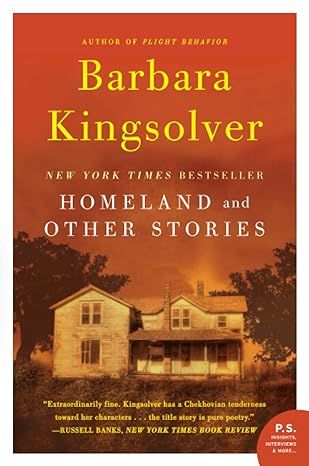
Homeland: And Other Stories
4.2
-
691
$5.24
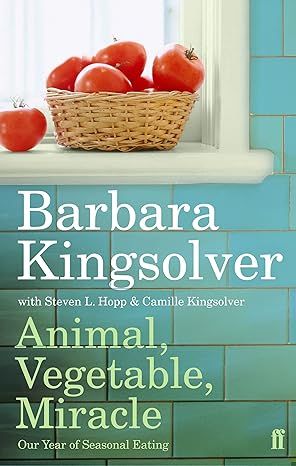
Animal, Vegetable, Miracle: Our Year of Seasonal Eating
4.5
-
2,496
$7.96
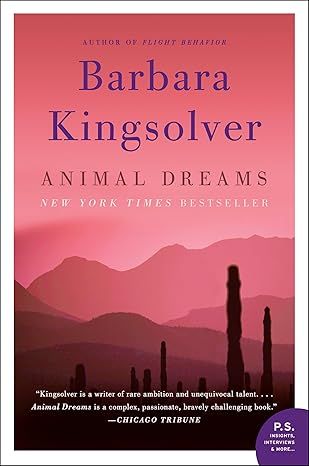
Animal Dreams: A Novel
4.4
-
2,888
$10.49
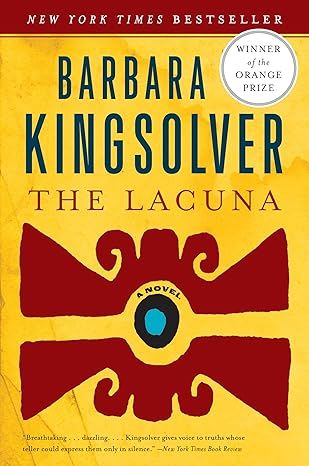
The Lacuna: A Novel (P.S.)
4.4
-
4,450
$1.77
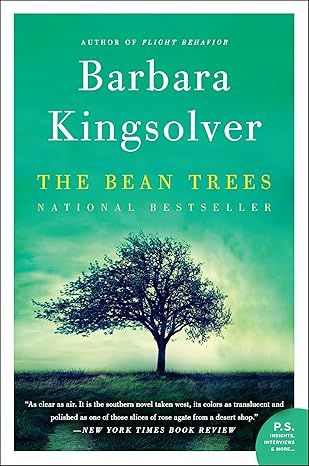
The Bean Trees Anniversary Edition: A Novel
4.4
-
11,504
$2.41
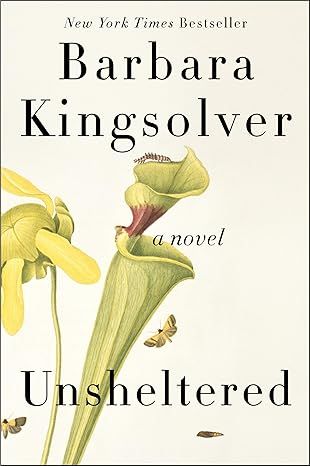
Unsheltered: A Novel
4.2
-
12,750
$5.24
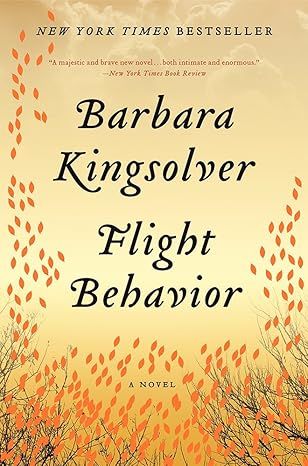
Flight Behavior: A Novel
4.3
-
9,479
$1.84
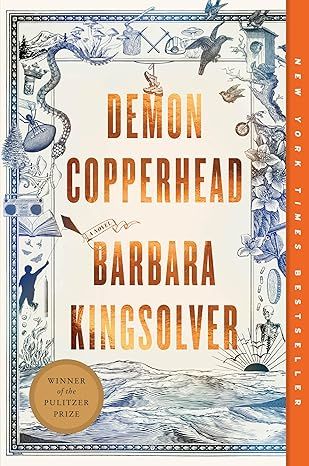
Demon Copperhead: A Novel
4.6
-
110,129
$16.99

The Poisonwood Bible: A Novel
4.5
-
16,256
$12.69
Similar Books
Best sellers
View all
The Tuscan Child
4.2
-
100,022
$8.39

The Thursday Murder Club: A Novel (A Thursday Murder Club Mystery)
4.3
-
155,575
$6.33

Sapiens: A Brief History of Humankind
4.6
-
140,302
$13.49

The Butterfly Garden (The Collector, 1)
4.3
-
88,556
$9.59

Things We Hide from the Light (Knockemout Series, 2)
4.4
-
94,890
$11.66

The Last Thing He Told Me: A Novel
4.3
-
154,085
$2.99

The Perfect Marriage: A Completely Gripping Psychological Suspense
4.3
-
143,196
$9.47

The Coworker
4.1
-
80,003
$13.48

First Lie Wins: A Novel (Random House Large Print)
4.3
-
54,062
$14.99

Mile High (Windy City Series Book 1)
4.4
-
59,745
$16.19

Layla
4.2
-
107,613
$8.99

The Locked Door
4.4
-
94,673
$8.53
